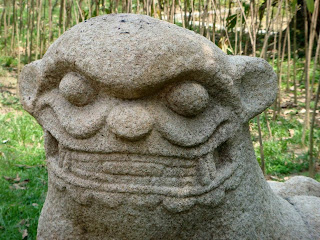改編唐朝故事 an old
story retold
遙遠山村扗一處斷崖下。崖,像國畫裏的那種,矗立凸天,崴崴峨峨。崖壁上長一種很特殊的靈果,下品為藥,可治百病,上品入貢為皇上專享。
三個外地青年想撿果致富,到山村來。他們第一眼看到崖壁,儍眼,從沒看過那麼高、那麼陡的山。第一個年輕人把裲襠往旁邊丟,抖抖肩、跺跺腳,說,「嘿,這難不倒我也!」二話不說,衝過去撲上巖壁,沒幾下子爬了四個人高。他往下看,跟同鄉青年說,「好啦,你們愣扗那裏沒關係,我先發財哈哈!」再往上爬,十個人高,他停住,說,「咦?再來怎麼爬?」他手往上伸,就一聲
啊
噫
阿
噫
阿
阿
噫
阿
◎
◎
。
。
‧
‧
咚
摔死了。
第二個青年看,坐下開始計畫怎麼爬,天天很認真想,「我看他們村人如何爬,我也研究他們的路線,可是這個山很高,我沒辦法,我很想發財,我再看他們怎麼爬,哇!很難!我辦不到,我不夠好,我再看他們怎麼爬,呀,真難,我沒辦法!我想,應該會有一些果實掉落,我就可以撿起來,對!一定會有果實掉落,我扗這裏等就好了。」古宋人守株待兔,此青年守崖待果,天天扗那裏等,鬢鬚慢慢白了,牙齒一一鬆了,就是不見靈果掉落。臨終時,他嘆一口氣說,「我很可憐,我就是沒有發財命,別人都發財,只有我沒有。我真可憐。」
第三個青年看,走來走去,換角度看斷崖,扗不同時辰觀察,了解巖石的狀況。他也觀察村人如何攀爬,在崖腳練習動作。村民背著滿滿的籃子下來,他幫他們接,很客氣的幫他們把籃子送回家;不久,大家認識這個青年,也說他人不錯。大家熟了,青年請教攀崖的訣竅,村人都侃侃說明,還帶他到崖腳傳授技藝,也教他怎麼選摘靈果。不到兩個月,第三個年輕人有把握,他跟村民一起爬上那個巨高的崖壁,帶了半籃靈果下來。再過一個月,他堆了很多上好的靈果。他分一半給村民,以示謝意。他們選了一簍上上品的靈果饋贈青年。他牽著五頭驢,馱著靈果到京師,將那簍上上靈果送進皇宮貢獻給皇上,名噪一時。很快,他開了一家藥材店,貨真價實,不到二十五歲已成為京師鼎鼎大名的藥劑大師,娶了宰相的女兒,幸福美滿,活到很老才壽終正寢,阿彌陀佛。
Once upon a time, in mountains far, far
away, a village sat at the foot of a huge cliff, the kind of cliff you see in
Chinese paintings. On the cliff grew a wondrous fruit. The poorest could be
used as medicine to treat all ills, and the finest were fit only for the
Emperor.
Three young men traveled to the village,
hoping to pluck some fruit and win their fortune. When they saw the size of the
cliff, they stopped in their tracks. They had never seen a cliff like that
before.
The first young man tossed his pack on the
ground, shook his shoulders and stamped his feet, saying, “I can handle this!”
He threw himself at the cliff, and in moments was up the cliff to a height of
four people. He looked down and said, “What are you waiting for? I’m not going
to wait for you, I’m going to get rich!” When he was about the height of ten
people, they heard him say, “Uh-oh, this is tricky!” He grabbed with his hand,
and fell
down
down
down
splat.
He died.
The second young man studied the cliff very
carefully every day. He said, “I’ll watch how the villagers climb, and study
their routes. But this cliff is really big, I can’t do it. I want to get rich. I’ll
watch how they do it. Wow, that’s difficult! I can’t do it, I’m not good
enough. I know! Some of these fruit must fall, so all I have to do is wait
here, and some will fall in my lap.” He waited and waited, but unlike Newton, nothing ever fell
down to him. His hair grew white, and one by one, his teeth bade him farewell. On
his deathbed, he lamented, “Poor me, I’m so unlucky! Everybody but me gets
rich, but not me! Poor me!”
The third young man examined the cliff from different angles,
watching as the sunlight showed features of the rock. He studied how the
villagers climbed, and tried some of their moves at the bottom of the cliff. At
the end of the day, when they came down with baskets laden, he was there to
take the baskets for them and deliver the baskets to their homes for them. Before
long, everybody knew this young man, and had good words to say about him. When
they all got to know each other, the young man asked for advice in climbing. The
villagers told him all they knew, and even took him to the rock face to show
him the techniques and teach him how to pluck the fruit. After two months, the
young man was ready to climb, and he followed the villagers up the gigantic
cliff. He came down with only half a basket that first day, but when another
month had passed, he had amassed a pile of fruit. He gave half to the villagers
as thanks. They selected a basket of their very finest fruit in return. The
young man left the village leading five donkeys packed to staggering with
fruit, and made his way to the capital. He took the select basket to the palace
and presented it as a gift to the emperor, which created a sensation. Soon he
opened a medicine store. His fruit was high quality and his prices were
reasonable. By the time he was 25, he was already an eminent apothecary. He
married the Prime Ministers daughter, had a happy life, and lived to a ripe old
age, and then he died in his bed. Amitabha.





